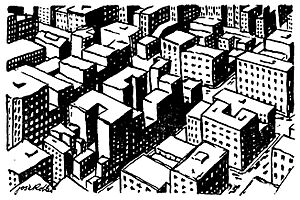José Robles facts for kids
José Robles Pazos (born in Santiago de Compostela, Spain, in 1897; died in 1937) was a Spanish writer, professor, and activist. He came from a wealthy family but believed in ideas that supported ordinary people and fairness. These beliefs made him leave Spain and live in the United States for a time.
Contents
Early Life and Work
In the 1920s, José Robles taught at Johns Hopkins University in the United States. He became good friends with the American writer John Dos Passos. Robles helped Dos Passos by translating his books into Spanish. His translation of the book Manhattan Transfer is still thought to be excellent. He also translated books by another famous writer, Sinclair Lewis.
Spanish Civil War and Disappearance
When the Spanish Civil War began, Robles was visiting Spain. He supported the side fighting for the Spanish Republic. However, Robles was very independent and spoke his mind. This caused problems with officials from the Soviet Union who were helping the Republic. These officials were gaining more control over the Spanish government.
In early 1937, José Robles disappeared. An American journalist, Josephine Herbst, found out that he had been arrested. She learned he was shot because some people thought he was a "spy" for the other side, led by Franco. She shared this news with writers Ernest Hemingway and John Dos Passos.
Mystery of His Death
The exact reasons for José Robles' death are still not fully clear. Many people doubted that he was truly a spy. Instead, it was believed that he was one of many people killed by Soviet agents. These agents were led by Alexander Orlov. They targeted people who had independent ideas and did not fully agree with the Soviet Union's plans.
John Dos Passos later wrote about his friend's death. He said that he learned Robles was killed by a "special section" that seemed to be controlled by the Communist Party. Some Spaniards close to the Communist Party said Robles was killed as an example. They claimed he had talked too much about military plans in a public place. Dos Passos believed the "spy" story was made up by American supporters of the Communists.
Writer Stephen Koch did research into Robles' death. He suggested that Robles was killed because he knew too much. Robles had been the translator for a high-ranking Soviet military leader named Yan Karlovich Berzin. Berzin did not speak Spanish. When Berzin disagreed with Alexander Orlov about how to fight the war, he lost favor with Stalin. Because Robles knew what was happening behind the scenes, his knowledge became a problem for the Soviets.
Impact on Friends
José Robles' death caused a big disagreement between his friends Ernest Hemingway and John Dos Passos. Hemingway thought the killing was "necessary in time of war." But Dos Passos was very upset by his friend's death. He stopped supporting the left-wing political ideas and began to move towards more conservative views.
José Robles' last days before he disappeared are shown in the 2012 movie Hemingway & Gellhorn.
See also
 In Spanish: José Robles Pazos para niños
In Spanish: José Robles Pazos para niños
 | Janet Taylor Pickett |
 | Synthia Saint James |
 | Howardena Pindell |
 | Faith Ringgold |


